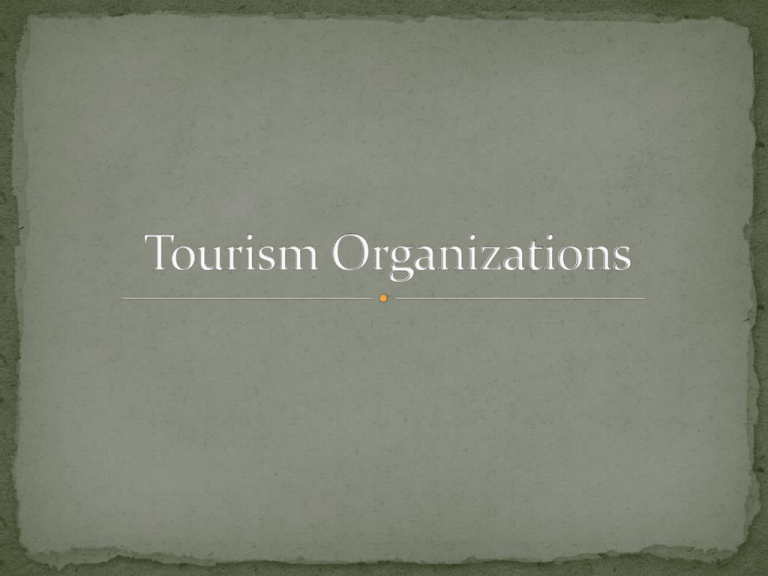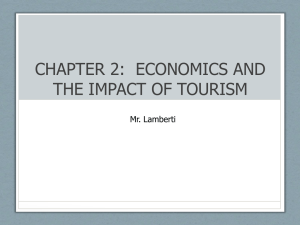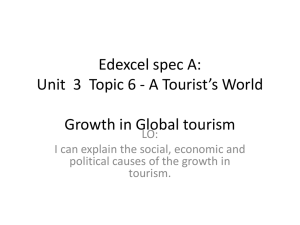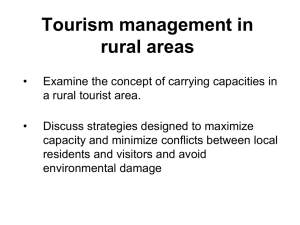
World Tourism Organization (WTO)
International Civil Aviation Organization (ICAO)
International Air Transport Association (IATA)
The WTO is the chief organization in tourism.
A governmental body which deals with all aspects of
tourism.
Began on January 2, 1975.
Before, it is called International Union of Official Travel
Organization, (IUTO), a nongovernmental technical body
set up at Hague, Netherlands in 1925 to promote tourism for
the economic, social, and cultural advancement of all nations.
Interrupted by World War II in 1946, reestablished in
London. Its headquarters was later transferred to Madrid.
Recognized by United Nations Conference on International
Travel and Tourism and considered as the main instrument
for the promotion of tourism.
The rapid expansion of travel had created the need for
a world body able to deal with tourism problems at the
government level and this led to the transformation of
IUTO into WTO.
And the intergovernmental organizations of universal
vocation providing an adequate framework for
government-level consultations, effective cooperation
between member states and formulation of decisions
on all questions relating to their policies in the field of
tourism.
The WTO works in cooperation with all international
organizations, particularly United Nations, as well as
with commercial and noncommercial bodies involved
in tourism.
There are three classes of members:
Full member
Associate member
Affiliate member
Full Members
Are sovereign states
Sovereignty is the quality of having independent authority over a
geographic area, such as a territory
A sovereign state is a nonphysical juridical entity of the international
legal system that is represented by a centralized government that has
supreme independent authority over a geographic area.
International law defines sovereign states as having a permanent
population, a government, and the capacity to enter into relations with
other sovereign states. It is also normally understood to be a state which
is neither dependent on nor subject to any other power or state.[
Associate Members
Are territories or groups of territories not responsible for their
external relations but whose membership is approved by the state
which assumes responsibility for their external relations.
Affiliate Members
Are international bodies both government and nongovernment
concerned with specialized interest in tourism, as well as
commercial and noncommercial bodies and associations whose
activities are related to the aims of WTO.
The WTO has created a number of regional
commissions such as the Regional Commission for
Tourism in Europe, the Regional Travel Commission
for the Americans, African Travel Commission, and
others. Technical commissions deals with specific
problems such as travel barriers and travel
development.
The WTO has the same legal character as the United
Nations and its specialized agencies. It has three
important legally functioning bodies:
General Assembly,
Executive Council, and the
Secretariat directed by a secretary-general.
The General Assembly, which meets once every two
years, is the supreme organ of the WTO.
It is composed of representatives from all member
states.
Each member has the right to vote in the decision-
making process. However, the Assembly resolutions
are not binding on the member states. They imply
recommendations.
The Executive Council, which meets at least twice a year, is
composed of members elected by the Assembly for a fouryear term based on a fair and equitable geographical
distribution.
The function of this council is to implement the decisions
of the Assembly and prepare for future sessions.
The Secretariat, headed by a secretary-general, carries out
the decisions of the General Assembly and the Executive
Council.
The secretary-general is elected every four years by the
General Assembly on the recommendation of the Executive
Council.
The primary aim of the WTO is to promote and
develop tourism, to contribute to the economic
development, international understanding, peace,
prosperity, and universal respect for human rights and
fundamental freedoms for all without distinction as to
race, sex, language, or religion.
WTO’s official publications:
International Travel Statistics
Travel Abroad – Frontier Formalities
Economic Review of World Tourism
Technical Bulletins
Manuals
The WTO:
Monitors and identifies trends in world tourism
Studies travel demands, marketing trends, tourist motivation,
and alternative approaches to marketing
Surveys the environmental effects of travel growth and makes
recommendations for the protection of natural and cultural
resources
Provides services for developing and organizing tourism for
countries
Serves as a clearing house for tourist information
Informs members about tourism development
Conducts vocational training programs
Works for the elimination or reduction of governmental
measures for international travel and the standardization of
requirements. This includes passports, visas, police
registration, and frontier formalities.
Assists and develops technical cooperation projects
Works to standardize equipment, terms, phraseology, and
signs as an aid to easier travel and understanding for foreign
visitors.
An organization of around 134 governments
Established for the purpose of promoting civil
aviation on a world wide scale.
Established at the Chicago conference of 1944.
Objectives:
Adopt international standards and to recommend
practices for regulating air navigation
Recommend installation of navigation facilities by
member countries
Set forth proposals for the reduction of customs
and immigration formalities
Plan for the safe and orderly growth of
international civil aviation throughout the world
Encourage the improvement of the art of aircraft
design and operation for peaceful purposes
Seek the development of airways, airports, and air
navigation facilities for international civil aviation
Provide for safe, regular, efficient, economical air
transportation
Discourage unreasonable competition
Insure that the rights of contracting countries are
fully respected, and that every member has a fair
opportunity to operate international airlines
Discourage discrimination between contracting
countries
Promote the development of all aspects of air
transportation
Established in 1945 in Havana.
Composed of airline operators attached to the national
delegations of the ICAO conference in Chicago.
Members includes more than 11 scheduled airlines.
Their objectives are:
To promote safe, regular, and economical air
transport, faster air commerce, and study problems
connected with the industry.
IATA serves as an agency through which airlines seek
jointly to solve problems that cannot be solved
individually.
It is involved in standardizing tickets, prices, weight
bills, baggage checks, and other documents. This helps
make travel uniforms throughout the world.
Organization for Economic Cooperation and
Development (OECD)
Pacific Asia Travel Association (PATA)
Caribbean Tourism Association (CTA)
Asia-Pacific Economic Cooperation (APEC)
Organization of American States (OAS)
Others:
South American Tourism Organization (SATO)
European Travel Commission (ETC)
Common Market Travel Association (CMTA)
Set up in a convention signed in Paris on December 14,
1960.
OECD established a tourism committee responsible for
coordinating studies, organizing meetings of member
countries to improve statistical methods of monetary
exchange and accounting, and assessing the policies of
member countries and their impact on tourism
OECD shall :
promote policies designed to achieve the highest
sustainable economic growth and employment
and a rising standard of living in member
countries, while maintaining financial stability
and contributing to the development of the
world economy;
Contribute to sound economic expansion in
economically developing nonmember countries
To contribute to the expansion of world trade on
a multilateral, nondiscriminatory basis in
accordance with international obligations
Members:
Australia
Austria
Belgium
Canada
Denmark
Finland
France
Germany
Greece
Iceland
- Ireland
- Turkey
- Italy
- the United Kingdom
- Japan
- United States
- Luxembourg
- the Netherlands
- New Zealand
- Norway
- Portugal
- Spain
- Switzerland
Organized in Hawaii in 1951.
Composed of more than one thousand organizations,
including governments, air and steamship lines,
wholesale and retail travel agencies, ground carriers,
hotels, publishers, advertisers, public relations firms,
and travel associations with major interests in Pacific
area.
Its purpose is to develop, promote, and facilitate travel
in the Pacific area (including Pakistan, the United
States, and Canada).
PATA was an early leader in recognizing the need for an
environmental ethic among those involved in the
tourism industry.
PATA has initiated the “PATA Code for Environmental
Tourism.” In this code, environmentally responsible
tourism means tourism which recognizes the necessity
of ensuring a sustainable future.
It meets the needs of the tourism industry today and
does not compromise the ability of this and future
generations to conserve the environment.
PATA’s model for an environmental ethic for the travel
and tourism industry foreshadows the power of
industry coalitions in directing future tourism trends
and their relationships with international economic
affairs.
PATA organizes a wide range of conferences, reports,
advertising, training programs, and seminars.
List of PATA’s publications:
Pacific Travel News
Annual Statistical Reports
Travel Market Study
Meetings Pacific (a country-by-country facilities guide)
PATA Trade Manual
Tourism International Research Pacific (quarterly)
Founded in 1951.
To encourage and assist in the development of tourism
throughout the Caribbean area.
Objectives:
Provide an instrument for close collaboration among the
various territories and countries concerned
Augment and assist local promotional and development
efforts of the members of the association and act as liaison
between the members
Provide liaison among member governments,
government agencies active in tourism development
and promotion, travel and transportation industries,
and organizations active in tourism and regional
development
Carry out advertising and publicity measures
calculated to focus the attention of the travelling
public upon the Caribbean as one of the world’s
outstanding vacation areas.
Encourage the promotion of adequate passenger
transportation services to and within the Caribbean
area and assist in the establishment of such services.
The promotion and development of inter-Caribbean
travel is also a particular concern of the association
Carry out statistical and research work relating to
travel trends and tourism development for the benefit
of the members
Negotiate with governments either directly or
through the appropriate bodies for an easing of
regulations and formalities which tend to be barriers
to tourist travel
To carry out this objectives, the CTA publishes
brochures, films, reports, newsletter, and other
information about the countries’ size, language,
currency, and so on.
Represents fifteen(15) countries
Australia
- the Philippines
Brunei
- Singapore
Canada
- Taiwan
Hong Kong
- Thailand
Indonesia
- the United States
Japan
Malaysia
New Zealand
People’s Republic of China
The purpose of APEC is to establish
coordination of national economics for the
benefit of countries in the Asia-Pacific region as
a whole.
The specific goals are to sustain the growth and
development of capital and technology in
keeping with the principles of the General
Agreement on Tariffs and Trade (GATT), and to
open and strengthen the open multi-lateral
trading system in the interest of Asia-Pacific and
all other economies.
APEC has ten (10) working groups including:
Tourism, Telecommunications, and
Transportation. Other groups include Human
Resource Development, Marine Resources,
Energy, Trade Promotion, Trade and Investment
Data, Investment and Technology Transfer, and
Fisheries.
APEC has a permanent Secretariat located in
Singapore. The Secretariat is to serve as a
coordinating body and the central repository for
all APEC documents.
The US Travel and Tourism Administration is the
first country chair of the Tourism Working Group
for APEC.
It is working to coordinate activities with the
Telecommunications and Transportation Groups.
As the multicultural process of negotiations for
tourism, telecommunications , and transportation
services falter with the stalemate of the GATT
Uruguay Board, the importance of interregional
tourism and trade agreements and organizations
such as APEC becomes apparent.
The main objective of the Organization of American States is to
strengthen relations between American states by providing advisory
services and training program in many fields including tourism.
Like OECD, tourism is an important component although its
principal motive was to promote economic growth. Thus OAS
conducts its number of travel studies and tourism development
programs.
Others:
South American Tourism Organization (SATO)
European Travel Commission (ETC)
Common Market Travel Association (CMTA)
All of which have been established to coordinate tourism
activities among and within member countries.
Role of National Organizations in Tourism
Planning – attracting foreign investment and funding
infrastructure development.
Employment and Training – determining manpower
needs, developing tourism training programs.
Coordinating Public and Private Sectors – determining
roles in mixed economics.
Responsible for the promotion of tourism in a particular
country and for the overall development of the tourist
industry.
Examples:
United States Travel and Tourism Administration and the
Department of Tourism in the Philippines.
Its importance varies from one country to another. In
some countries, tourism organizations are the full
ministry or cabinet level while in others, it may be a
subcabinet level or a council or information post.
Is the primary government agency charged with the responsibility
to encourage, promote, and develop tourism as a major
socioeconomic activity, to generate foreign currency and
employment, and to spread the benefits of tourism to a wider
segment of the population, to assure the safe, convenient, enjoyable
stay and travel of the foreign and local tourist in the country.
Headed by the Secretary of Tourism who is assisted by
three (3) undersecretaries and one assistant secretary.
The Assistant Secretary for Internal Services and
Legislative Liaison is responsible for the Legal Service,
Administrative Service as well as the Financial and
Management Service.
The Undersecretary for Planning, Product Development,
and Coordination is responsible for the Office of Tourism
Development Planning, Office of Product Research and
Development as well as the Office of Tourism
Coordination.
The Undersecretary for Tourism Service is responsible for
the Office of Tourism Standards, National Capital Region,
and all Regional Offices.
Daniel G. Corpuz
Undersecretary, Tourism Planning
and Promotions
Atty. Maria Victoria V. Jasmin
Undersecretary, Tourism
Regulation, Coordination &
Resource Generation
RAMON R. JIMENEZ, JR.
DOT Secretary
Ma. Theresa I. Martinez
Undersecretary, Office of
Special Concerns and
Legislative Liaison Office
Grace R. Yoro
Director, Office of
Financial and
Management Affairs
Atty. Eugene T. Kaw
Assistant Secretary and Chief of
Staff
Adriana M. Flor
OIC, Office of Administrative
Affairs
Benito C. Bengzon, Jr.
Assistant Secretary,
International Tourism
Promotions
Evelyn A. Macayayong
OIC, Office of Marketing
Communications
Rolando Canizal
Assistant Secretary,
Tourism Development
Planning
Ms. Jemimah-Fay L, Alentajan
Head Executive Assistant
Maria Rica C. Bueno
Director, Office of Tourism
Standards and Regulations
Ma. Cynthia C. Lazo
Director, Domestic Tourism
Promotions
Shalimar Hofer Tamano
Director, Office of Special
Concerns
Ma. Corazon G. Jorda-Apo
Director, Office of Asia & the
Pacific
Verna Esmeralda C. Buensuceso
Director, Office of Americas, Europe &
the Middle East
Atty. Evelyn R. Cajigal
Director, Office of Legal
Affairs
The Undersecretary for Tourism Promotions is
responsible for the Bureau of Domestic Promotions,
Bureau of International Tourism Promotions as well as
the Office of Tourism Information.
Directly under the Secretary of Tourism are the
National Parks and Development Committee, the
Philippine Convention and Visitors Corporation, the
Philippine Tourism Authority, the Intramuros
Administration, and the Nayong Pilipino Foundation,
Inc.
The fifteen (15) regional offices of the DOT are responsible
for the domestic tourism promotion, tourism marketing
accreditation, tourism assistance, public relations, and
coordination with local government units and tourism
stockholders in the region.
The regional offices are in support of the government’s
policy of decentralization under the Local Government
Code.
The DOT regional offices are also actively involved in the
formulation of Regional Tourism Master Plans (RTMP)
that will serve as the framework in the development of
travel and tourism in the Philippines.
The regional offices are located in the following ares:
Baguio City
San Fernando, La Union with sub-offices in Laoag City
Tuguegarao, Cagayan
San Fernando, Pampanga with sub-office in Clark
Legazpi City, Iloilo with sub-offices in Bacolod City and
Boracay Island
Cebu City, Tacloban City
Zamboanga City
Cagayan de Oro City
Davao City
Cotabato City
Butuan City
The oiffices of Region IV and the NCR are housed in the
DOT Building on T.M. Kalaw St. Manila
There are five (5) attached agencies that help the DOT
in the performance of its functions.
Philippine Tourism Authority (PTA)
Philippine Convention and Visitors Corporation (PCVC)
Intramuros Administration (IA)
National Parks and Development Committee (NPDC)
Nayong Pilipino Foundation (NPF)
Philippine Tourism Authority (PTA)
Composed of a General Manager and Deputy General
Managers for Administration, Finance, Infrastructure,
and Operations.
Vested with the powers and functions provided under
Presidential Decree No. 189 as amended by Presidential
Decree No. 564. These are:
To implement policies and programs of the Department
pertaining to the development, promotion, and supervision
of tourism projects in the Philippines.
To promote the development into integrated resort
complexes of selected and well-defined geographic areas with
potential value, known as tourist zones. Such tourist zones
shall consist of underdeveloped areas the ownership of which
may be partially or wholly acquired by the Authority.
To extend all forms of assistance to private enterprise in
understanding tourism projects.
To undertake on its own account or in joint venture with the
private sector the operation and maintenance of essential
tourist facilities which private enterprise alone is not
prepared or willing to undertake.
To assure availability of land at reasonable prices or rental
rates for private investors in hotels and other tourist facilities.
To coordinate and help implement tourism-related plans or
operations of local governments, government agencies,
public corporations and where necessary, those of private
entities.
Philippine Convention and Visitors Corporation (PCVC)
Was created under Executive Decree 867, was transformed
into a nonstock, nonprofit corporation by virtue of
Executive Decree 1448.
Its operation was strengthened through the issuance of
Executive Order 120-A to cover not only the marketing of
conventions and incentive travel but also general tourism.
The PCVC is managed by an Executive Director and Deputy
Executive Directors for Convention and Incentive Travel,
Travel Trade, and Corporate Affairs.
The PCVC has the following objectives:
Create and maintain organizational machinery to plane,
develop, and execute a campaign and conventions in the
Philippines.
Conducts a continuing program to promote and project
Metro Manila as a Convention City.
Supervise, assist and coordinate all activities related to the
smooth operation of various congress and conventions to be
held in the country.
Oversee the requirements and general welfare of the
conventioneers.
Encourage and promote the development of skills and
services connected with or forming an integral part in the
holding of International congresses and conventions.










